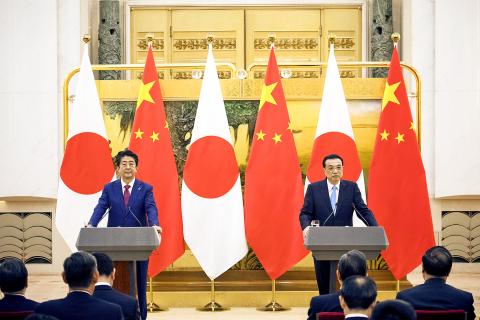China and Japan yesterday signed US$2.6 billion in business deals and touted their warmer ties during a rare visit to Beijing by Japanese Prime Minister Shinzo Abe.
Chinese Premier Li Keqiang (李克強) greeted Abe as the Japanese national flag flew outside the Great Hall of the People across from Tiananmen Square and they reviewed an honor guard before going inside for talks.
Relations between Asia’s two biggest economies have improved in recent years after they sunk to new lows in 2012, when Tokyo “nationalized” disputed islands claimed by Taiwan and China.

Photo: Bloomberg
Addressing a joint news conference, Abe said that the two leaders had agreed to “play a constructive role for the sake of this region’s peace and prosperity.”
“I believe active trade will deepen ties between Japanese and Chinese peoples further,” Abe said.
“International conditions are unstable and uncertainties have increased,” Li said, adding that the nations’ economic cooperation would “benefit the development of global free trade.”
The relationship has rapidly warmed after US President Donald Trump imposed massive tariffs on China while also targeting Japanese exports in an effort to cut US trade deficits.
Abe traveled with nearly 1,000 delegates from Japanese companies, who struck 500 deals worth a combined US$2.6 billion, Li said, without providing details.
The companies are eager for increased access to China’s massive market, while Beijing is interested in Japanese technology and corporate know-how.
“Though the US is quite an influential factor in China-Japan ties, the effect is limited,” the Global Times newspaper said in an editorial.
“If Beijing and Tokyo intend to plan their future bilateral relationship based on Washington’s attitude, they will only get lost,” the state-run daily said.
The two leaders oversaw the signing of several political agreements, including a currency swap deal and a mechanism to avoid accidental clashes between their militaries, which often come in contact in the East China Sea.
The previous official visit to Beijing by a Japanese prime minister was in 2011.
Abe’s three-day trip, which began on Thursday, sets up the possibility that Chinese President Xi Jinping (習近平) will visit Japan next year.

Nvidia Corp yesterday unveiled its new high-speed interconnect technology, NVLink Fusion, with Taiwanese application-specific IC (ASIC) designers Alchip Technologies Ltd (世芯) and MediaTek Inc (聯發科) among the first to adopt the technology to help build semi-custom artificial intelligence (AI) infrastructure for hyperscalers. Nvidia has opened its technology to outside users, as hyperscalers and cloud service providers are building their own cost-effective AI chips, or accelerators, used in AI servers by leveraging ASIC firms’ designing capabilities to reduce their dependence on Nvidia. Previously, NVLink technology was only available for Nvidia’s own AI platform. “NVLink Fusion opens Nvidia’s AI platform and rich ecosystem for

WARNING: From Jan. 1 last year to the end of last month, 89 Taiwanese have gone missing or been detained in China, the MAC said, urging people to carefully consider travel to China Lax enforcement had made virtually moot regulations banning civil servants from making unauthorized visits to China, the Control Yuan said yesterday. Several agencies allowed personnel to travel to China after they submitted explanations for the trip written using artificial intelligence or provided no reason at all, the Control Yuan said in a statement, following an investigation headed by Control Yuan member Lin Wen-cheng (林文程). The probe identified 318 civil servants who traveled to China without permission in the past 10 years, but the true number could be close to 1,000, the Control Yuan said. The public employees investigated were not engaged in national

ALL TOGETHER: Only by including Taiwan can the WHA fully exemplify its commitment to ‘One World for Health,’ the representative offices of eight nations in Taiwan said The representative offices in Taiwan of eight nations yesterday issued a joint statement reiterating their support for Taiwan’s meaningful engagement with the WHO and for Taipei’s participation as an observer at the World Health Assembly (WHA). The joint statement came as Taiwan has not received an invitation to this year’s WHA, which started yesterday and runs until Tuesday next week. This year’s meeting of the decisionmaking body of the WHO in Geneva, Switzerland, would be the ninth consecutive year Taiwan has been excluded. The eight offices, which reaffirmed their support for Taiwan, are the British Office Taipei, the Australian Office Taipei, the

DANGEROUS DRIVERS: The proposal follows a fatal incident on Monday involving a 78-year-old driver, which killed three people and injured 12 The Ministry of Transportation and Communications yesterday said it would lower the age for elderly drivers to renew their license from 75 to 70 as part of efforts to address safety issues caused by senior motorists. The new policy was proposed in light of a deadly incident on Monday in New Taipei City’s Sansia District (三峽), in which a 78-year-old motorist surnamed Yu (余) sped through a school zone, killing three people and injuring 12. Last night, another driver sped down a street in Tainan’s Yuching District (玉井), killing one pedestrian and injuring two. The incidents have sparked public discussion over whether seniors